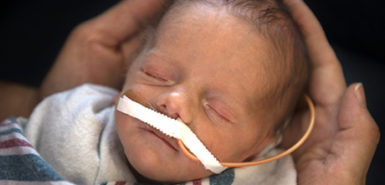
One of the tougher questions to ask – and answer – is whether her baby has any genetic problems or other birth defects.
For those who do decide to seek this type of health analysis of their baby prior to birth, a relatively new test has been gaining in popularity among patients and doctors alike.
Cell free fetal DNA (cffDNA) is a noninvasive prenatal screening test that uses a blood sample from an expectant mother to analyze bits of baby’s DNA that have leaked into her bloodstream.
Research has shown it is more accurate at spotting potential chromosomal abnormalities and less likely to flag a normal pregnancy as high risk than standard screening tests offered to pregnant women.
Current noninvasive screening tools, used routinely since the 1970s, include ultrasound imaging and maternal blood tests to look for genetic abnormalities and other birth defects.
The cffDNA test, introduced in 2011, is more specific and sensitive, particularly in predicting the presence of extra chromosomes that cause conditions such as Down syndrome and Edwards syndrome. The test can also detect disorders involving an extra sex chromosome.
According to a 2014 study published in The New England Journal of Medicine, the cffDNA test was 10 times better in predicting cases of Down syndrome than the standard blood test and ultrasound screening, and five times better in predicting Edwards syndrome. It also greatly reduced the number of false-positive results.
While cffDNA had been tested previously among women at high risk of having children with chromosomal abnormalities, this trial was the first among a general population of pregnant women with typical risks.
A good option for high-risk pregnancy
Currently, the American College of Obstetricians and Gynecologists recommends the cffDNA test be offered to women with the following risk factors after pre-test genetic counseling:
- Advanced maternal age: 35 years or older
- A fetal ultrasound result indicating an increased risk of chromosome abnormality
- A previous pregnancy with chromosome abnormality
- A positive first trimester or second trimester maternal screening test
- A known genetic abnormality in the mother or father
The testing is not recommended for low-risk pregnancies at this time.
Not necessarily an amnio alternative
“While the cell free fetal DNA test is much more accurate than other current screening tests, it’s important to note that it’s not a diagnostic test,” said Vivian Romero, MD, a maternal and fetal medicine specialist with Spectrum Health Medical Group.
A screening test can determine if a patient is at increased risk of having a baby with a birth defect, but doesn’t give a definitive answer. An additional diagnostic procedure, usually amniocentesis or chorionic villus sampling (CVS), is required to confirm the test result.
These diagnostic procedures are considered the gold standard for prenatal genetic testing, but doctors must put a needle into the womb to collect cells that contain fetal DNA. While these procedures can tell for certain if a fetus is abnormal, they are invasive, so also carry a small risk of miscarriage.
“The results of a noninvasive screening test like cell free fetal DNA can help a patient decide if she wants to have a more invasive diagnostic test,” Dr. Romero said. “If she has any of the above risk factors, undergoes genetic counseling and has a positive screening test, she’s then offered the option of invasive diagnostic testing.”
If a patient has a negative screening test, it doesn’t completely ensure that the pregnancy is normal. She can, however, feel much more confident that an amnio or CVS is not necessary.
“The cell free fetal DNA test has been helpful in reducing the number of CVS and amniocentesis procedures we do,” Dr. Romero said. “Anything that helps bring added peace of mind for the mother, and an extra measure of safety for the baby, is a positive in my book.”
 /a>
/a>
 /a>
/a>
 /a>
/a>